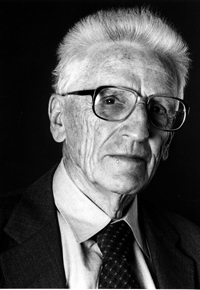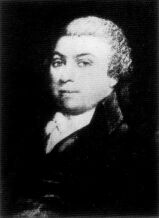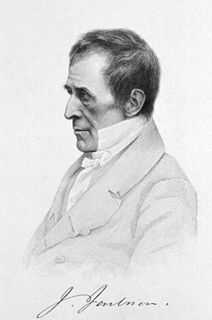David Tappan (1752–1803) was an American theologian. He occupied the Hollis Chair at Harvard Divinity School until his death in 1803. [1] He was elected a Fellow of the American Academy of Arts and Sciences in 1796. [2] He graduated from Harvard University in 1771.

The United States of America (USA), commonly known as the United States or America, is a country composed of 50 states, a federal district, five major self-governing territories, and various possessions. At 3.8 million square miles, the United States is the world's third or fourth largest country by total area and is slightly smaller than the entire continent of Europe's 3.9 million square miles. With a population of over 327 million people, the U.S. is the third most populous country. The capital is Washington, D.C., and the largest city by population is New York City. Forty-eight states and the capital's federal district are contiguous in North America between Canada and Mexico. The State of Alaska is in the northwest corner of North America, bordered by Canada to the east and across the Bering Strait from Russia to the west. The State of Hawaii is an archipelago in the mid-Pacific Ocean. The U.S. territories are scattered about the Pacific Ocean and the Caribbean Sea, stretching across nine official time zones. The extremely diverse geography, climate, and wildlife of the United States make it one of the world's 17 megadiverse countries.
The Hollis Chair of Divinity is an endowed chair at Harvard Divinity School. It was established in 1721 by Thomas Hollis, a wealthy English merchant and benefactor of the university, at a salary of £80 per year. It is the oldest endowed chair in the United States, the first professorship in theology in the country, and in the early 19th century it was considered to be "the most prestigious endowed professorship in America".

Harvard Divinity School is one of the constituent schools of Harvard University, located in Cambridge, Massachusetts, United States. As of June 2015, the school's mission is to train and educate its students either in the academic study of religion, or for the practice of a religious ministry or other public service vocation. It also caters to students from other Harvard schools that are interested in the former field. Harvard Divinity School is among a small group of university-based, non-denominational divinity schools in the United States (the others include the University of Chicago Divinity School, Yale Divinity School, Vanderbilt University Divinity School, Wake Forest University School of Divinity and Claremont Graduate University-Department of Religion.












